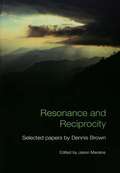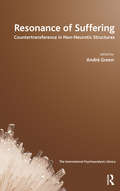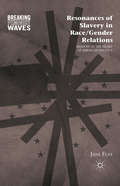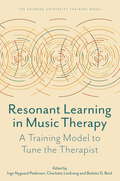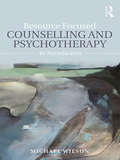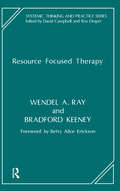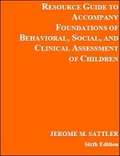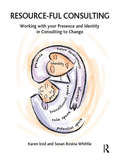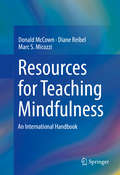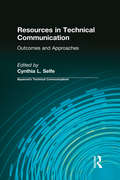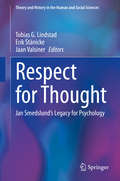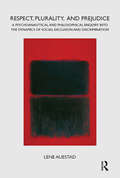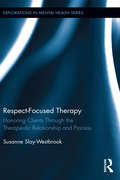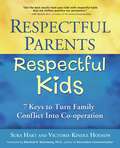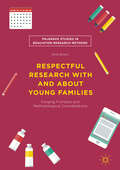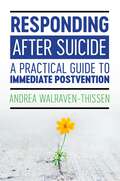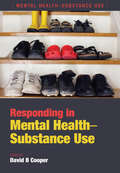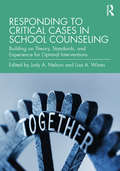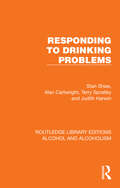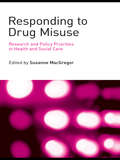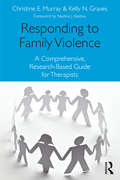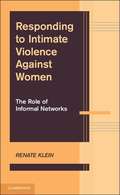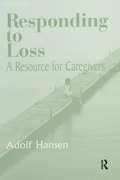- Table View
- List View
Resonance and Reciprocity: Selected Papers by Dennis Brown
by Jason MaratosThis collection of papers, published between 1976 and 2003, traces the innovative connections which the eminent group analyst Dennis Brown made between medicine and psychoanalysis. They reveal his important insights into how the principles of group analysis can improve our understanding of philosophy and ethics, and trace the development of trans-cultural dimensions of group analysis. Beginning with Dennis’ early work in dermatology, the first section of Resonance and Reciprocity provides a fascinating overview of the insights gained into psychosomatic conditions through the application of psychoanalysis and group analysis. The second section builds on the tenet of group analysis that therapy should change the therapist as well as the client, addressing the changes that can take place in the therapeutic milieu, both in client and provider. The chapter on drowsiness, a modern classic, provides a significant contribution to our understanding of the emotional and physical changes that the therapist experiences during analysis, and its wider implications for our appreciation of how changes in mental and physical states are affected by a person’s emotional world. The final section reveals how Dennis Brown extended his interest and his activities beyond the individual, the small and the large group, and studied groups within and across cultures. This book provides not only a solid understanding of complex analytical notions but also opens the road for future development. It will appeal to students and professionals in psychoanalysis, psychotherapy and group psychotherapy.
Resonance of Suffering: Countertransference in Non-Neurotic Structures
by Andre GreenSome sixty years after the "Controversial Discussions" in the early 40s, this passionate book resurrects their spirit on a global scale. Under the aurthor's generous, tactful yet strong leadership, a small discussion group of noteworthy analysts of the International Psychoanalytical Association, coming from all the theoretical and geographical regions in today's psychoanalytic Babel, met several times over three years in order to deal, by way of the detailed discussion of their clinical experiences, with what to many of those involved was and still is a polemical concept: that of the borderline patient. Such a concept, widely accepted in the United States, remains controversial in many parts of the psychoanalytic universe, mainly in what concerns the multifaceted relationship between psychoanalytic and psychiatric categories. To be remarked upon is the sincerity put to play by the participants in expressing their doubts, their agreements and their disagreements in the heady process of developing a grasp on the others' viewpoint.
Resonances of Slavery in Race/Gender Relations: Shadow at the Heart of American Politics
by Jane FlaxJane Flax argues that a reciprocal relationship exists between unconscious processes and race/gender domination and that unless we attend to these unconscious processes, no adequate remedy for the malignant consequences of our current race/gender practices and relations can be devised. Flax supports her arguments using a variety of sources.
Resonant Learning in Music Therapy: A Training Model to Tune the Therapist
by Niels Hannibal Lars Ole Bonde Hanne Mette Ridder Stine Lindahl Jacobsen Ulla Holck Sanne StormResonant learning allows students to develop and fine-tune their therapeutic competencies through first-hand experiences: being in client roles themselves, being in preliminary therapist roles with co-students in client roles and reflecting on those experiences. These resonant learning processes are preparatory steps in developing a professional music therapist identity through internship and later employment positions and continuing supervision. Outlining the Aalborg model of resonant learning, developed at Aalborg University, Denmark, Resonant Learning in Music Therapy discusses the benefits and drawbacks of 'tuning the therapist' and encourages its integration into music therapy courses around the world.The book sums up research on resonant learning and presents core exercises, directives and vignettes from the training processes of the Aalborg model. Explaining how students' self-agency is enhanced by long-term personal experiences in group- and individual therapy, observing work with clients in an institutional setting, working with clients themselves, and undergoing close group and individual supervision, the editors and contributors also explore the benefits of implementing resonant learning within other therapist training programs and healthcare professions.
Resource Focused Counselling and Psychotherapy: An Introduction
by Michael WilsonTherapists sometimes ask: What supports you in life? What gets you through difficult times? Our ‘journey’ in life relies on a range of resources to equip and fulfil us. Knowing about these resources, however, is not enough: for lasting benefits, they must be bodily felt experiences. The aim of this book is to illustrate the holistic purpose of therapy to resource integration of the client. It draws upon extensive material to affirm that the practice of contemporary therapy benefits from insights gained from evolving neuroscience. Particular emphasis is put on the benefits of drawing on the dimensions of experience to strengthen ego processes like self-awareness and self-regulation, and engage with the depths of being, including ‘soul’. Resource Focused Counselling and Psychotherapy provides professionals with a comprehensive and integrative model of resource focused therapy, drawing upon clinical examples and the current range of research and theory surrounding this emerging approach. Additionally, the book contains a range of self-resourcing exercises and practices for each part of the integrative model, enabling individuals to develop self-resources for greater resilience and well-being in their own lives. This book is an important read for psychotherapists, psychologists and counsellors, including those working with trauma. It also provides valuable insights for modalities practising from a psycho-spiritual perspective, including Jungian and transpersonal psychotherapists.
Resource Focused Therapy (The Systemic Thinking and Practice Series)
by Bradford Keeney Wendel A. RayFor some time the family therapy field has been moving away from a problem-based approach to work with clients. Ideas such as "creating a new family story", focusing on strengths and solutions, and making contracts with family members have all shifted interest toward a new approach to therapy. The authors have been in the forefront of this thinking for several years and they have been experimenting with their ideas by working together with clients in order to create their own coherent, effective model for therapy. Resource Focused Therapy is the result!
Resource Guide for Assessment of Children: Cognitive Foundations and Applications
by Jerome M. SattlerThis volume provides extensive tables to help in interpreting the WISC-V, WPPSI-IV, SB5, DAS-II, and WJ IV COG. It also contains appendixes focusing on laws pertaining to children with special needs (IDEA, Section 504, and ADA), testifying as an expert witness, and test reviews.
Resource Guide to Accompany Foundations of Behavioral, Social, and Clinical Assessment of Children (Sixth Edition)
by Jerome M. SattlerResource Guide to Accompany Foundations of Behavioral, Social, and Clinical Assessment of Children (Sixth Edition)
Resource-ful Consulting: Working with your Presence and Identity in Consulting to Change
by Karen Izod Susan Rosina WhittleConsultants and practitioners working with change can feel at a loss as to how to help their clients move forward. Organisations get stuck in routine ways even when they have innovations in mind. Consultants get stuck in familiar interventions which no longer prove stimulating or effective. Such challenges to practice can preoccupy and reinforce these stuck positions. Drawing on the authors' experiences of working with the professional development of consultants and change-agents over many years, this book provides an asset-based approach to consulting, where the resources to work at this 'stuckness' come from the way that we think about and use ourselves: our Identity and our Presence. The authors propose that developing capacities to recognise and analyse who we bring into our consulting, and how we bring ourselves is central to resource-ful practice. Without a skill-ful integration of these resources, the potential for change can be compromised. In handbook format, the book is structured in seven sections: Potential Space, Identity, Presence, Role Space, Practice, Change, and Future Developments.
Resources for Teaching Mindfulness
by Donald Mccown Marc S. Micozzi Diane ReibelThis master-class-in-a-book isdesigned to guide teachers of mindfulness-based interventions (MBI) in continuingto develop more competence while raising global standards of practice andpedagogy. Starting with the central yet elusive concept of stewardship, it thenexpands upon the core components of MBI pedagogy. A series of reflective essaysby MBI teachers from around the world foregrounds differences and challenges inmeeting participants "where they are. " Such reflections are both inspiring andthought-provoking for teachers --wherever they are. The book also providespractical guidance and tools for adjusting teaching style and content forspecial populations, from chronic pain patients to trauma survivors, from healthcare professionals to clergy, and including many others. Detailed scripts andpractices, ready to adopt and adapt, offer opportunities to explore newdirections in the classroom, and to continue the life-long development of theteacher. Included in the coverage: Deepening teachers' skills of guidance of meditation practices Insights into the essential practice of inquiry and dialogue with participants New practices that allow participants to explore mindfulness together in a spoken encounter How to keep up with, review, and make clear to participants the range of scientific evidence supporting the MBIs The breadth of practical insightsand hands-on strategies makes Resourcesfor Teaching Mindfulness a unique developmental asset for a wide range ofpractitioners around the world. Among those who will benefit are physicians and other medical practitioners,health and clinical psychologists, marriage and family therapists, nurses,clinical social workers, physical and occupational therapists, health educators,and organizational development specialists.
Resources in Technical Communication: Outcomes and Approaches (Baywood's Technical Communications)
by Cynthia L SelfeProvides the instructors of introductory technical communication courses with a set of resources for their classrooms.
Respect for Thought: Jan Smedslund’s Legacy for Psychology (Theory and History in the Human and Social Sciences)
by Jaan Valsiner Tobias G. Lindstad Erik StänickeThis book explores and provides an overview of the Norwegian psychologist Jan Smedslund's life work on Psycho-logic. His contributions to science have been radical not only in challenging the empirical foundation of psychology, but also in seeking to develop a viable alternative. This book brings together various reflections on his key contributions from the 1960s to the present day. The volume features three chapters by Jan Smedslund, offering his updated views on psychological science and psychotherapy. It also features contributions from several scholars that critically evaluates his legacy. His seminal ideas are discussed, revised and expanded upon and the questions raised are put in relevant historical and interdisciplinary context. Respect for Thought is a valuable resource for psychological researchers, historians of psychology, cultural psychologists, critical psychologists, theoretical psychologists, clinical psychologists and psychotherapists, social scientists, philosophers of psychology, and philosophers of science.
Respect, Plurality, and Prejudice: A Psychoanalytical and Philosophical Enquiry into the Dynamics of Social Exclusion and Discrimination
by Lene AuestadThis book helps us understand the current resurgence of social prejudice against ethnic minority groups, the logics of scapegoating and the resulting violence. Our time is characterised by a growth in expressed hostility and violence towards people who are perceived as 'others'. Hatred towards and discrimination against minorities is on the rise. This book presents a new understanding of prejudice, racism, antisemitism, xenophobia, islamophobia, sexism and homophobia. It combines philosophy with psychoanalytic thinking, sociology and psycho-social studies, analysing the unconscious elements of social processes. The author makes a case for framing a questioning of prejudice, not in terms of normality versus pathology or deviance, but in what is socially unconscious. Hypocrisy and double standards are inherent in our social practices, reflecting the contradictions present in our thinking about these issues: that we both believe and do not believe in equality.
Respect-Focused Therapy: Honoring Clients through the Therapeutic Relationship and Process (Explorations in Mental Health #18)
by Susanne Slay-WestbrookTherapists have a unique opportunity and responsibility to provide a respectful environment for their clients, yet respect has not received adequate attention in the psychotherapy community and related research. Respect-Focused Therapy: Honoring Clients Through the Therapeutic Relationship and Process sets forth the formulation of respect-focused therapy (RFT), a new approach to psychotherapy that addresses the quality of the client–therapist relationship and therapeutic process. This volume treats respect as a combination of action, attitude and open-mindedness, urging therapists to recognize their own biases and beliefs and be willing to suspend them for the benefit of their clients. Using Martin Buber’s "I-Thou" relationship as a conceptual model, Slay-Westbrook provides core principles of respect and demonstrates how to incorporate these into the therapeutic relationship to best foster a healing environment.
Respectful Parents, Respectful Kids: 7 Keys to Turn Family Conflict Into Co-operation
by Sura Hart Victoria Kindle HodsonMore than a tool to correct bad behavior, this handbook urges parents to move beyond typical discipline techniques by creating an environment based on mutual respect, emotional safety, and positive, open communication. The seven outlined principles redefine the parent-dominated family by teaching parents how to achieve mutual parent/child respect without being submissive, set firm limits without using demands or coercion, and empower children to open up, cooperate, and realize their own innate potential. Based on Marshall Rosenberg's Nonviolent Communication process, the framework helps parents break down the barriers to outstanding relationships with their kids by avoiding destructive language and habits that keep parents and children from understanding one another. Activities, stories, and resources help parents immediately apply the seven keys to any parenting situation.
Respectful Research With and About Young Families: Forging Frontiers and Methodological Considerations (Palgrave Studies in Education Research Methods)
by Alice BrownThis book explores the distinctive theoretical and methodological features associated with conducting ethical and respectful research with young families, along with its unique considerations and challenges. With parents and young children understood to be both major players and ‘first educators’ in supporting childhood health, development and learning, this book examines how opportunities for research can be conceptualised within this privileged space. This volume embraces an interdisciplinary approach to this research, examining topics such as researcher identity and positioning, issues of consent, notions of power and relationships with families, methods for collecting data and frameworks for making sense of that data. Rather than providing concrete methods of practices and tools, this book will help raise the consciousness of researchers who are engaged in research with these young families. It is sure to appeal to students and scholars of education and early childhood development, as well as those concerned with conducting research ethically and respectfully.
Responding After Suicide: A Practical Guide to Immediate Postvention
by Andrea Walraven-ThissenThis practical guide about what first responders should do after a suicide, offers advice on identifying and recording a death as suicide, breaking the bad news and dealing with the impact of suicide in the short, middle and long term.Drawing on her own experience as a first responder and trainer, the author provides guidance and tips for best practice when responding to a suicide. These include what can happen to the body in the immediate aftermath, how to talk to the bereaved to limit or prevent secondary trauma, and how to manage suicide in public arenas such as schools. The scenarios covered include detailed scripts of how to deal with difficult situations. There are also sections that tackle complex issues such as religious or cultural customs, and unusual cases of suicide which can pose extra challenges.Straightforward and full of sage advice, each chapter includes real-world examples from the author's many years working as a first responder which highlight how suicide postvention techniques can be applied.
Responding in Mental Health-Substance Use (Radcliffe Ser.)
by David B. CooperMental health-substance use is a complex interrelation, with equally complex implications for individuals and their families, health professionals and society. Although its international recognition as an issue of critical importance is growing, clear guidance for professionals on mental health-substance use and its treatment is hard to find. The Mental Health-Substance Use series addresses this need, concentrating on concerns, dilemmas and concepts that impact on the life and well-being of affected individuals and those close to them, and the future direction of practice, education, research, services, interventions, and treatment. Having outlined the field and service development in previous books, the third book in the series explores how professionals can best respond to the particular concerns and dilemmas arising from and in mental health-substance use for individuals and their families. It aims to inform, develop and educate these responses by sharing knowledge and enhancing expertise in this fast-developing field by exploring the interrelated psychological, physical, social, legal and spiritual experiences. The volumes in this series are designed to challenge concepts and stimulate debate, exploring all aspects of the development in treatment, intervention and care responses, and the adoption of research-led best practice. They are essential reading for mental health and substance use professionals, students and educators.
Responding to Conflict in Africa
by Jane BouldenAfrica has been the source of some of the international community's most devastating failures and important successes in conflict management. The purpose of this book is to examine the issues and experiences associated with the increased level of activity between the United Nations and regional organizations in their efforts to address conflict in Africa. Using nine case studies and an overview of recent changes at the institutional level this book assesses what these experiences tell us about the United Nations, about African regional organizations, and about conflict management processes.
Responding to Critical Cases in School Counseling: Building on Theory, Standards, and Experience for Optimal Crisis Intervention
by Judy A. Nelson; Lisa A. WinesThis book helps school counselors and other school personnel navigate the complexities of the most common critical cases that are urgent and difficult in schools in the 21st century. Counselor educators who use this text will help trainees learn to take a methodical approach to critical cases and to be prepared for the difficult situations they will encounter including cases involving violence, cases of an existential nature, cases involving inappropriate adult behavior, and cases impacting the school community. After a description of the case, the reader is provided with the theories, standards, and experiences that are relevant to the case to formulate a response that is based on foundational principles of the school counseling profession. Contributing counselors from around the country explain what they do when critical cases present themselves, and this text provides their tools, wisdom, and professional judgments and offers training that embraces the reality of the school counselor profession to all counselors, educators, and trainees.
Responding to Drinking Problems (Routledge Library Editions: Alcohol and Alcoholism)
by Judith Harwin Stan Shaw Alan Cartwright Terry SpratleyIn the 1970s family doctors, social workers, researchers and administrators had been aware of the inadequacy of the response to drinking problems for some time. However, there had been no systematic examination of why such agents felt negatively about drinkers and disinclined to respond to them. Originally published in 1978, this book develops a radical new perspective on the prevalence and causes of drinking problems, combining reviews of historical and contemporary literature with the authors’ own research studies. This perspective is then linked to the need for an integrated response from both medical and social services, with a particular accent on the need for a community response. By focusing on the relationship between helper and helped a solution is sought to the question which has troubled the field for many years: why are agents like family doctors and social workers so inadequate in recognising and responding to people with drinking problems? The crucial aspects within the therapeutic relationship are pinpointed and experimental studies are described which show how training, casework, supervision and the redeployment of expertise can help improve recognition rates and responses to individual drinkers. This book thus expresses the need for major changes both in our attitudes and understanding of people with drinking problems and the difficulties of agents who try to help them. It should still be of historical interest to social scientists and those involved in helping people with drinking problems.
Responding to Drug Misuse: Research and Policy Priorities in Health and Social Care
by Susanne MacGregorResponding to Drug Misuse provides a unique insight into the current shape of the drugs treatment system in England. Reporting findings from research linked to the government's ten year drugs strategy Tackling Drugs to Build a Better Britain, the book places these in the context of policy, practice, and service development. It goes on to discuss the implications of these findings for the government’s new strategy Drugs: Protecting Families and Communities. Throughout the book contributors reflect on current debates on drug strategies and social policy and consider the relevance of the findings for policy and practice. Topics discussed include: recent trends in drug policy and how these link to crime responses of dedicated drug treatment services service users' perceptions and suggestions for improvement the impact of drug misuse on children, families and communities. This timely addition to the literature on drug misuse will be essential for substance use practitioners, including social workers, psychiatrists, psychologists and nurses. It will also supply helpful guidance for health and social care commissioners and policy providers.
Responding to Family Violence: A Comprehensive, Research-Based Guide for Therapists
by Christine E. Murray Kelly N. GravesThe comprehensive theory- and research-based guidelines provided in this text help answer the personal and professional questions therapists have as they provide competent clinical treatment to clients who have experienced family violence. It presents academic, scholarly, and statistical terms in an accessible and user-friendly way, with useful take-away points for practitioners such as clarifying contradictory findings, summarizing major research-based implications and guidelines, and addressing the unique clinical challenges faced by mental health professionals. Both professionals and students in graduate-level mental health training programs will find the presentation of information and exercises highly useful, and will appreciate the breadth of topics covered: intimate partner violence, battering, child maltreatment and adult survivors, co-occurring substance abuse, the abuse of vulnerable populations, cultural issues, prevention, and self-care. Professionals and students alike will find that, with this book, they can help their clients overcome the significant traumas and challenges they face to let their strength and resilience shine through.
Responding to Intimate Violence Against Women
by Renate KleinFamily members, friends, coworkers and neighbors are often the first to know that a woman has been abused by an intimate male partner. What is the proper course of action for those with knowledge of abuse? Using a wide range of empirical data from international sources, Renate Klein documents informal third parties as the first port of call, sources of support and interference, and gatekeepers to formal services. Family and social network members disrupt ongoing assaults, respond to disclosures of abuse and provide solace and practical help. These networks do not always side with victims, however, and may either sympathize with or actively support perpetrators. Klein illuminates the complexities of these contingent situations. Her analysis highlights the potential of informal third parties for effective intervention, demonstrating their significant role in promoting societies free from rape and domestic violence.
Responding to Loss: A Resource for Caregivers (Death, Value and Meaning Series)
by Adolf HansenReading this book, caregivers will find ways to increase their effectiveness by understanding more fully what their care receivers are experiencing, by finding creative ways to assist them in processing what is happening, and by working with them to discern responses to loss that are emotionally healthy, intellectually coherent, spiritually genuine, culturally sensitive, relationally authentic, and personally fulfilling.
